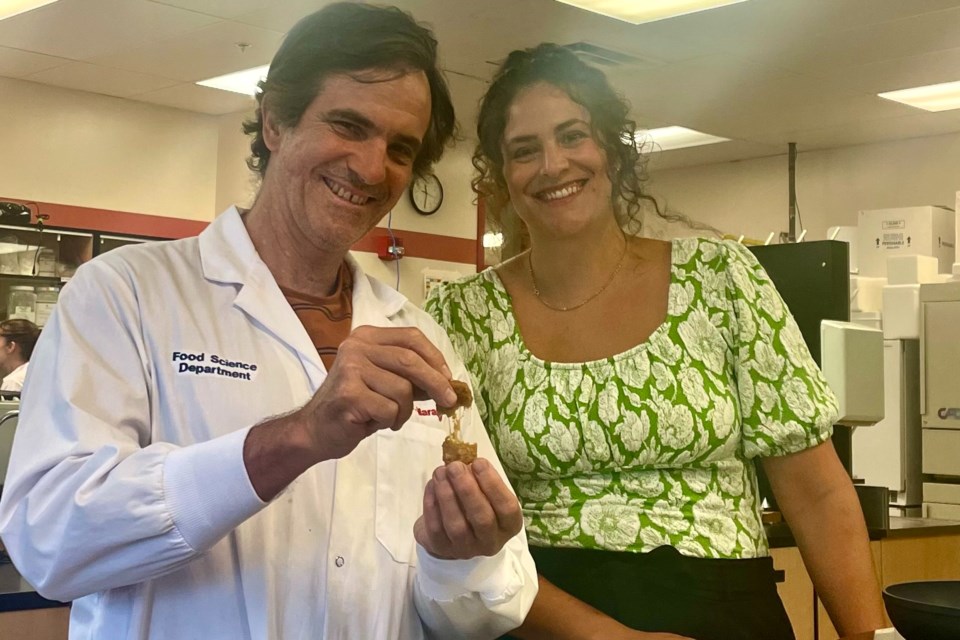These days, there is no shortage of plant-based meat alternatives, many of which replicate the texture and taste of animal protein. But that texture comes at a price: these products are typically high in price, with a long list of synthetic ingredients.
But Researchers at the University of Guelph say they have found a way to get around that, replicating the texture of meat by using a corn protein called zein.
The protein is often a waste product of corn meal, and while it might be used in animal feed and natural herbicide, it’s actually more natural than some of the ingredients in popular plant-based meats on the market, said professor Alejandro Marangoni, who has been working on the product alongside PhD student Stacie Dobson.
Marangoni eats a primarily plant-based diet, and was struck by the high cost of meat alternatives. And even at that higher cost, the flavour isn’t always great and the ingredient lists are a mile long.
“It's huge, including a lot of names that may or may not scare some consumers, because (it has) a lot of additives and all the proceeds.”
Those additives are needed because plant proteins don’t have the same structure as animal proteins – they’re missing things like collagen and connective tissue that make up the familiar texture of a burger, for example.
“So you have to add a lot of components in order to try to make that kind of texture,” he said. Otherwise, it would end up more like a tofu burger.
The texture in meat comes from fibres, which can be recreated through extrusion, a process that uses mechanical and thermal energy to cook the protein sources and change their inherent structure, resulting in a more meaty texture. The process is helpful for texture, but consumes a lot of energy, he said.
The other component is a binding additive, either gluten or methyl cellulose (a compound derived from cellulose, often sold as a thickener), both of which can cause digestive problems.
“They're not good for gluten intolerant people, all these products. But if you don't use gluten, you use methyl cellulose.”
Methyl cellulose ferments in your large intestine since it doesn’t break down, “which can cause some intestinal discomfort.”
Because of this, Marangoni said he and many others struggle to eat certain plant-based meat products, which is why they wanted to find an alternative.
Zein is more sustainable since it’s often a waste product, and one produced locally. It’s also digestible and gluten free, since it derives from corn, and it doesn't need to go through extrusion.
“We learned how to mess around with this protein and plasticize it,” which made it gooey, like bread dough, he said. It’s that gooey texture that’s needed to bind things together when creating plant-based meat alternatives.
They mixed it ”with the usual mixture of starch and plant protein,” and rather than using extrusion, stretched and folded it again and again until it took on a fibrous texture, just like you would with a dough.
The end result? It takes on the same texture of a beef burger, without all the synthetic additives and extrusion.
Marangoni said products like these are more important than ever, given the huge impact climate change has and is having on the environment.
And it’s not just the sustainability of meat versus a pea, for example.
"It’s the sustainability of meat versus the Impossible Burger, which contains all of that extrusion, all that methyl cellulose. But even those funky products are better than eating a piece of red meat,” he said, adding that beef is a sustainable disaster, pointing to excessive water use, accelerated growth of animals, antibiotic use, land use, waste management, along with the greenhouse gas emissions.
Aquaculture too, is just as bad or even worse, he said, and oceans are quickly being depleted.
“We're not left with too many choices. So this is a weird attempt at helping with sustainability. And that is really the prime motivation for this.”
The next step is to find producers who can help them scale up production and incorporate different flavours.



